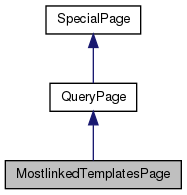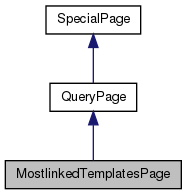Special page lists templates with a large number of transclusion links, i.e. More...


Public Member Functions | |
| __construct ($name= 'Mostlinkedtemplates') | |
| formatResult ($skin, $result) | |
| Format a result row. | |
| getQueryInfo () | |
| Subclasses return an SQL query here, formatted as an array with the following keys: tables => Table(s) for passing to Database::select() fields => Field(s) for passing to Database::select(), may be * conds => WHERE conditions options => options join_conds => JOIN conditions. | |
| isExpensive () | |
| Is this report expensive, i.e should it be cached? | |
| isSyndicated () | |
| Is there a feed available? | |
| preprocessResults ($db, $res) | |
| Pre-cache page existence to speed up link generation. | |
| sortDescending () | |
| Sort the results in descending order? | |
Private Member Functions | |
| makeWlhLink ($title, $result) | |
| Make a "what links here" link for a given title. | |
Detailed Description
Special page lists templates with a large number of transclusion links, i.e.
"most used" templates
Definition at line 31 of file SpecialMostlinkedtemplates.php.
Constructor & Destructor Documentation
| MostlinkedTemplatesPage::__construct | ( | $ | name = 'Mostlinkedtemplates' | ) |
Definition at line 33 of file SpecialMostlinkedtemplates.php.
Member Function Documentation
| MostlinkedTemplatesPage::formatResult | ( | $ | skin, |
| $ | result | ||
| ) |
Format a result row.
- Parameters:
-
$skin Skin to use for UI elements $result Result row
- Returns:
- String
Reimplemented from QueryPage.
Definition at line 98 of file SpecialMostlinkedtemplates.php.
References $result, $title, SpecialPage\getLanguage(), Linker\link(), Title\makeTitle(), and makeWlhLink().

Subclasses return an SQL query here, formatted as an array with the following keys: tables => Table(s) for passing to Database::select() fields => Field(s) for passing to Database::select(), may be * conds => WHERE conditions options => options join_conds => JOIN conditions.
Note that the query itself should return the following three columns: 'namespace', 'title', and 'value'. 'value' is used for sorting.
These may be stored in the querycache table for expensive queries, and that cached data will be returned sometimes, so the presence of extra fields can't be relied upon. The cached 'value' column will be an integer; non-numeric values are useful only for sorting the initial query (except if they're timestamps, see usesTimestamps()).
Don't include an ORDER or LIMIT clause, they will be added.
If this function is not overridden or returns something other than an array, getSQL() will be used instead. This is for backwards compatibility only and is strongly deprecated.
- Returns:
- array
- Since:
- 1.18
Reimplemented from QueryPage.
Definition at line 64 of file SpecialMostlinkedtemplates.php.
Is this report expensive, i.e should it be cached?
- Returns:
- Boolean
Reimplemented from QueryPage.
Definition at line 42 of file SpecialMostlinkedtemplates.php.
Is there a feed available?
- Returns:
- Boolean
Reimplemented from QueryPage.
Definition at line 51 of file SpecialMostlinkedtemplates.php.
| MostlinkedTemplatesPage::makeWlhLink | ( | $ | title, |
| $ | result | ||
| ) | [private] |
Make a "what links here" link for a given title.
- Parameters:
-
$title Title to make the link for $result Result row
- Returns:
- String
Definition at line 114 of file SpecialMostlinkedtemplates.php.
References $result, $title, SpecialPage\getTitleFor(), Linker\link(), and SpecialPage\msg().
Referenced by formatResult().


| MostlinkedTemplatesPage::preprocessResults | ( | $ | db, |
| $ | res | ||
| ) |
Pre-cache page existence to speed up link generation.
- Parameters:
-
$db Database connection $res ResultWrapper
Reimplemented from QueryPage.
Definition at line 81 of file SpecialMostlinkedtemplates.php.
References $res.
Sort the results in descending order?
- Returns:
- Boolean
Reimplemented from QueryPage.
Definition at line 60 of file SpecialMostlinkedtemplates.php.
The documentation for this class was generated from the following file:
- includes/specials/SpecialMostlinkedtemplates.php
